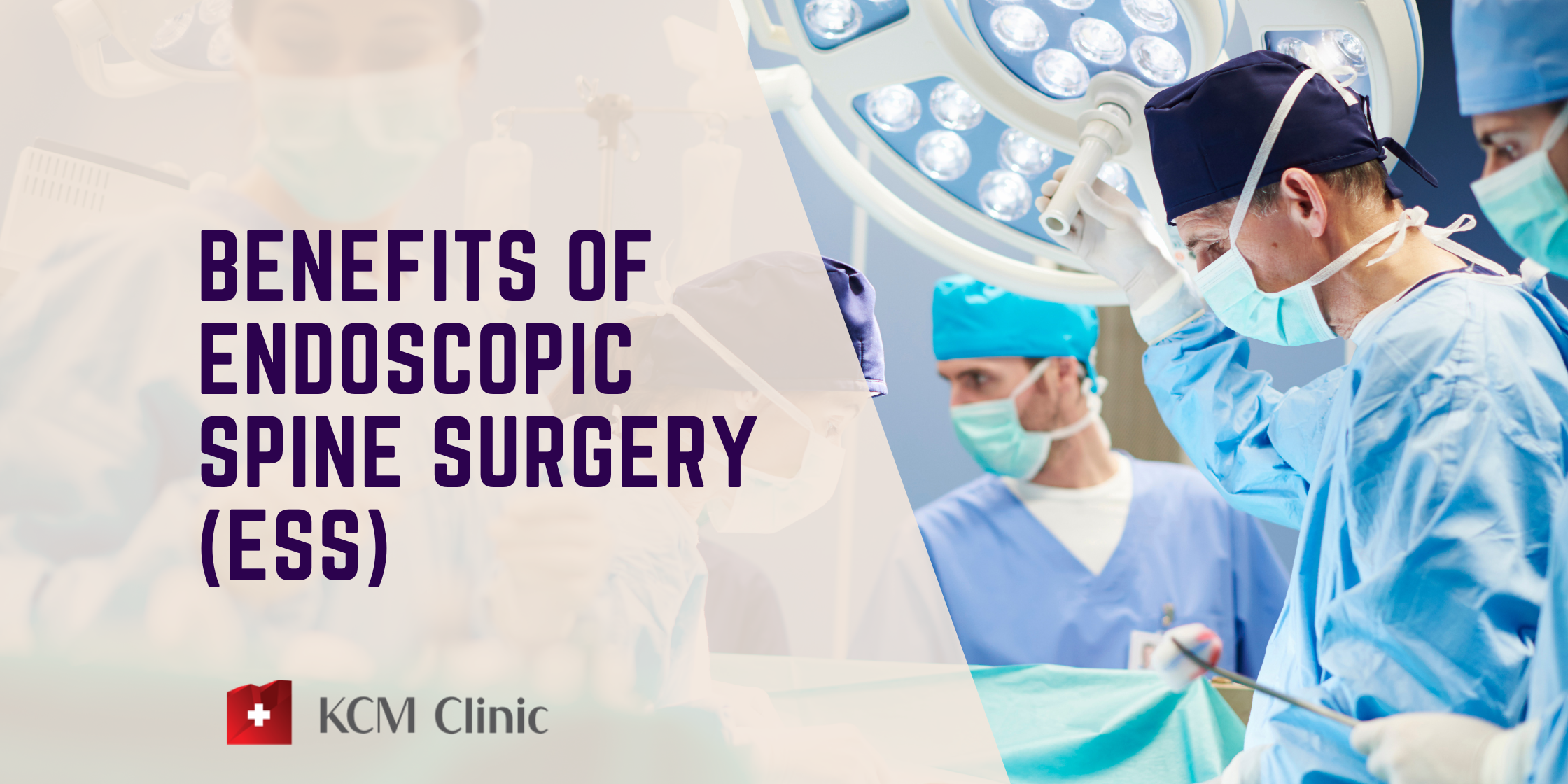Benefits of endoscopic spine surgery (ESS)
Endoscopic spine surgery (ESS) is an innovative surgical technique that is playing an increasingly significant role in modern minimally invasive spine surgery.
Less invasive than traditional open surgery, treating spine-related conditions endoscopically allows for less trauma, faster recovery and fewer risks. Used to treat chronic pain syndromes and discopathies, the procedure involves making a micro incision and using an endoscope to see and treat the area.
Although endoscopic surgical methods have been widely used for years to treat other areas (e.g. the gastrointestinal tract), endoscopic surgery for the spine has only recently been used thanks to new advancements in optics, tissue visualisation and spinal imaging.
Today, endoscopic spine surgery is considered the safest spinal surgery for many patients.
At KCM Clinic’s Minimally Invasive Spine and Neurosurgery Center, we have performed over 3000 endoscopic spine procedures using the latest generation of equipment from the world leader in endoscopic spine technology, i.e. RiWO Spine (formerly Richard Wolf GmbH). Our team of experienced and specialised neurosurgeons and neuroorthopedists use a comprehensive approach that include on-site diagnostics, pre- and post-operative outpatient care, and professional on-site rehabilitation with physiotherapists.
Get in touch if you’d like to know more!
What is endoscopic spine surgery?
When we develop disc hernias, protrusions or other conditions in our spine, the pain can become unbearable and carrying out simple activities can become extremely difficult. Your doctor will most likely first recommend conservative treatments, including physiotherapy, exercise, stretching, exercise, or corticosteroids. When these treatments are not beneficial in the long run, surgery might be the only treatment that really helps.
Endoscopic spine surgery is a minimally invasive surgical procedure used to remove herniated disc material that is pressing on a nerve or the spinal cord. This innovative treatment can treat conditions in the cervical, lumbar and thoracic spine.
Rehabilitation and physiotherapy before and after surgery also play a very important role to guarantee the success of the procedure and long-term stable improvement.
The effectiveness of these procedures has been confirmed in several scientific studies around the world. For this reason, minimally invasive endoscopic spine surgery is used in procedures not only on the lumbar spine (lumbosacral section) but also on the thoracic and cervical spine.
How does endoscopic spine surgery work?
The first step of endoscopic spine surgery involves administering general or local anaesthesia, so that the area will become completely numb. Then, the neurosurgeon will make a 15-mm incision and use a guide wire for the correct positioning of the surgical instruments. The incision is kept open with a dilator and the endoscope is inserted. An HD camera is attached to the top of the endoscope, so that the surgical team gets a clear view of the area. The high-quality 4k imaging on the monitor allows the surgeon to perform the surgery with efficiency and safety. Then, the herniated and vertebral disc tissue will be removed with forceps so that compression on the nerves is relieved. An endoscopic spine surgery is performed in 30 minutes – 1 hour.
What are the benefits of having endoscopic spine surgery?
There are several benefits related to endoscopic spine surgery.
It’s minimally invasive
Compared to traditional spine surgery, endoscopic spine surgery is minimally invasive. It is performed by microdissection, a surgical technique that reduces the need to incise skin tissues and spinal muscles. This means that trauma in the treated area is minimal and that recovery time is much quicker.
Moreover, a special instrument is used to perform the procedure: an endoscope with a HD camera that treats the hernia from the inside. This way, the risk of damage to the spinal cord is reduced.
Short hospital stay
Patients undergoing endoscopic spine surgery typically stay at our clinic for just one day (up to 2 days in some cases). This is possible because of the minimal invasiveness of the procedure: among the most important benefits is the small incision of the surgical site, which causes less trauma to the skin, muscles and soft tissues. As a result, blood loss is reduced as well as the risk of complications, which allow for a shorter hospital stay.
Faster recovery
Most endoscopic spine surgeries can be performed in about one hour. Patients can be on their feet just a few hours after the procedure.
Many patients feel an immediate pain relief right after surgery. You might experience some pain, but it will be treated with pain medications. Overall, recovery is much faster compared to open surgery. Patients are recommended to follow post-op guidelines to ensure a successful recovery. Doing physiotherapy and rehabilitation will also play a major role and will ensure that the procedure is successful in the long term.
Endoscopic spine surgery vs open spine surgery
Endoscopic spine surgery has great advantages compared to open surgery. The main benefit is that endoscopy treatment is less invasive, so the tissues in the operated area are minimally affected by the surgery. Moreover, endoscopy will leave a much smaller scar compared to traditional spine surgery. Hospital stay and recovery time are shorter, and the risk of complications during and after the procedure is much lower.
Is endoscopic spine surgery right for me?
Always discuss with your surgeon what benefits and risks endoscopic spine surgery might have in your specific case. Get in touch for a first consultation!
In order to assess whether you’re eligible for the procedure, we will have to carry out a thorough diagnosis. We might ask you to perform an MRI or CT scan of your spine, if you haven’t done one in the last 6 months.
Send Request
Register
Visits, hospital procedures
Bariatric Surgery Center
Plastic Surgery Center
Spine Surgery Center
Dental Clinic
OMEGA Imaging Diagnostic Center
Work hours
KCM Clinic Wrocław
Chat KCM Clinic
Locations
KCM Clinic Jelenia Góra
KCM Clinic Wrocław
Parking








